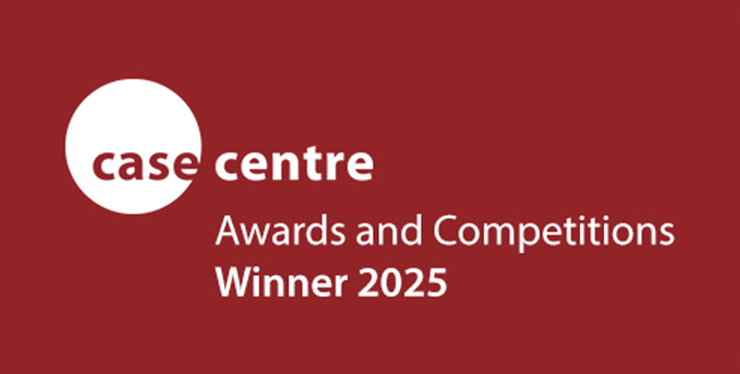Fighting absolute poverty with philanthropic impact investment

This webinar with Vanina Farber, elea Chair of Social Innovation and Peter Wuffli, Founder and Chairman of elea Foundation for Ethics in Globalization, appeared live on Wednesday, 8th April at 11am CET.
With more than 2 billion people having to cope with living on less than 3 dollars a day, Professor Vanina Farber and Dr Peter Wuffli explore how a simple formula developed from the elea Foudation’s work can help solve social and environmental challenges: Entrepreneurship x Capital = Impact + Innovation.
In the first in this series of webinars focusing on philanthropic impact investment, Professor Vanina Farber characterises an impact investor as “somebody who actively places capital in enterprises that generate a measurable, desired, beneficial, social or environmental outcome that would not occur if their investment was not there.” She explains how to be considered as such, impact investment needs to meet the following criteria:
- harbor an active and desired intention to achieve a specific social or environmental impact
- possess “additionality”, which means that if the investor hadn’t invested in these enterprises commercial money would probably not be available
- be producing financial returns that can range broadly from highly concessionary money to market returns
Off the back of the COVID-19 crisis, Professor Vanina Farber discussed how corporations are asking themselves “How can I be useful?” and “How can I use my resources to serve society?”
From the creation of the elea Foundation for Ethics and Globalization in 2006, Dr Peter Wuffli outlines the main investment themes the Foundation now covers as well as its pillars of work, which include finding new philanthropic investments, engaging philanthropic capital and professional development.
But how is impact measured? At the elea Foundation, a point system for measuring impact has been established, starting with benefits for direct beneficiaries of the investment. The “impact point” system then examines the business model of the social enterprise, how sustainable it is and how well it manages risk. Finally, “elea leverage” is incorporated into the point system in which the elea Foundation examines the value that it brings to the project. The outcome is a rating through which impact of specific interventions can be measured.
One question raised related to the balance in roles played between private equity and corporate venture capital when it comes to impact investing. Dr Peter Wuffli outlined the powerful combination of collaborating with the elea Foundation with (a) a specific focus on, and expertise in, social impact and (b) the “impatience” of seeing direct outcomes. This combination is common in the stance that venture capitalists take in impact investing.
Enterprise building is incredibly important to philanthropic impact investment, too. Dr Wuffli explains that for every Swiss franc or US dollar that the elea Foundation uses for risk capital – for example in the form of a grant or debt – an equal amount is invested in helping entrepreneurs build the right governance for social enterprises. This could be in the form of helping to develop business plans, building organizational capacity, developing governance to manage crises and raising funds.
“It is hard professional work. Impact investing can’t be done by volunteering one’s free time on a Friday afternoon after a full day’s work elsewhere. This is a profession and takes professionalism.” But the rewards are particularly high, as Dr Wuffli describes: “There is enormous satisfaction and meaningfulness in this work. When you visit companies, when you see what a difference some social enterprises can bring to millions of lives in a sustainable way, it is just incredibly satisfying.”
Contrary to the immediate assumption we might have about impact investing, Dr Peter Wuffli says “The entrepreneurs are the scarce resource. Not the money. There is a lot of money around but entrepreneurs who are able to leverage capital for impact and innovation: this is the scarce resource.”
Professor Vanina Farber and Dr Peter Wuffli are in the process of writing a book called “The elea Way: a learning journey towards sustainable impact”, which will be published in the coming months by Routledge.
To find out more about upcoming webinars from the elea Center for Social Innovation, please visit the Center’s page here.
Research Information & Knowledge Hub for additional information on IMD publications
We investigate family CEO birth order as an antecedent of family firms' CSR behavior. Despite psychology literature recognizing it as a key predictor of individual behavior, birth order has been largely neglected in management research. Drawing on...
With climate change and economic inequality intensifying global challenges, the imperative for companies to create social impact and foster inclusion has never been more critical. Firms can offer a pathway to a more prosperous, equitable, and sust...
IKEA launched the Welcome Home project in Belgium to make a meaningful impact by supporting single-parent families. Originating from a cross-departmental brainstorming session, the program initially focused on donating funds and furniture to shelt...
Picking up where Case A ends, Case B reveals that Grupo Inca decided to innovate internally and develop a new fabric from the rare black alpaca fiber. After nearly three years of effort, the Inoue brothers’ dream of creating a luxury collection fr...

Grupo Inca, a conglomerate that owned Peru’s leading textile business with a long history of working with alpaca fleece, was at a crossroads regarding the conservation and commercialization of black alpaca fiber. Historically, black alpacas were a...
Pasona Group, a Japan-based human resources company, is committed to driving social change through business and supporting individuals to find "ikigai” (fulfillment) through work. The company has promoted flexible work and equitable workplaces and...

Social enterprises are organizations that address pressing social and environmental challenges—such as poverty, inequality, and environmental degradation—through market-based activities. With over ten million social enterprises globally generating...
How can innovative solutions to address societal grand challenges be cultivated in a pragmatic and impactful way? In this article, we propose the “lean impact start-up” framework, which integrates the principles of the lean start-up methodology wi...

Here’s how returning to the office can rebuild social connections, boost creativity and collaboration, and foster long-term organizational success
Although corporate social responsibility (CSR) has received considerable attention in family firms, empirical findings on the CSR/family firm performance nexus are mixed and inconsistent. This meta-analytic review aims to clarify the mixed results...
in Strategic Entrepreneurship Journal 25 December 2024, ePub before print, https://doi.org/10.1002/sej.1530
Research Information & Knowledge Hub for additional information on IMD publications
in Binder, Julia Katharina (Ed.); Haanaes, Knut Bjarne (Ed.) / Leading the sustainable business transformation: A playbook from IMD, pp. 101-112 / Hoboken: Wiley, 2025
Research Information & Knowledge Hub for additional information on IMD publications
Research Information & Knowledge Hub for additional information on IMD publications
Case reference: IMD-7-2610 ©2024
Research Information & Knowledge Hub for additional information on IMD publications
Case reference: IMD-7-2609 ©2024
Research Information & Knowledge Hub for additional information on IMD publications
Research Information & Knowledge Hub for additional information on IMD publications
in Management Studies Insights Blog 7 November 2024
Research Information & Knowledge Hub for additional information on IMD publications
in Journal of Management November 2024, vol. 50, no. 8, pp. 3139-3161, https://doi.org/10.1177/01492063241240713
Research Information & Knowledge Hub for additional information on IMD publications
in I by IMD
Research Information & Knowledge Hub for additional information on IMD publications
in Corporate Social Responsibility and Environmental Management 25 October 2024, ePub before print, https://doi.org/10.1002/csr.3004
Research Information & Knowledge Hub for additional information on IMD publications



